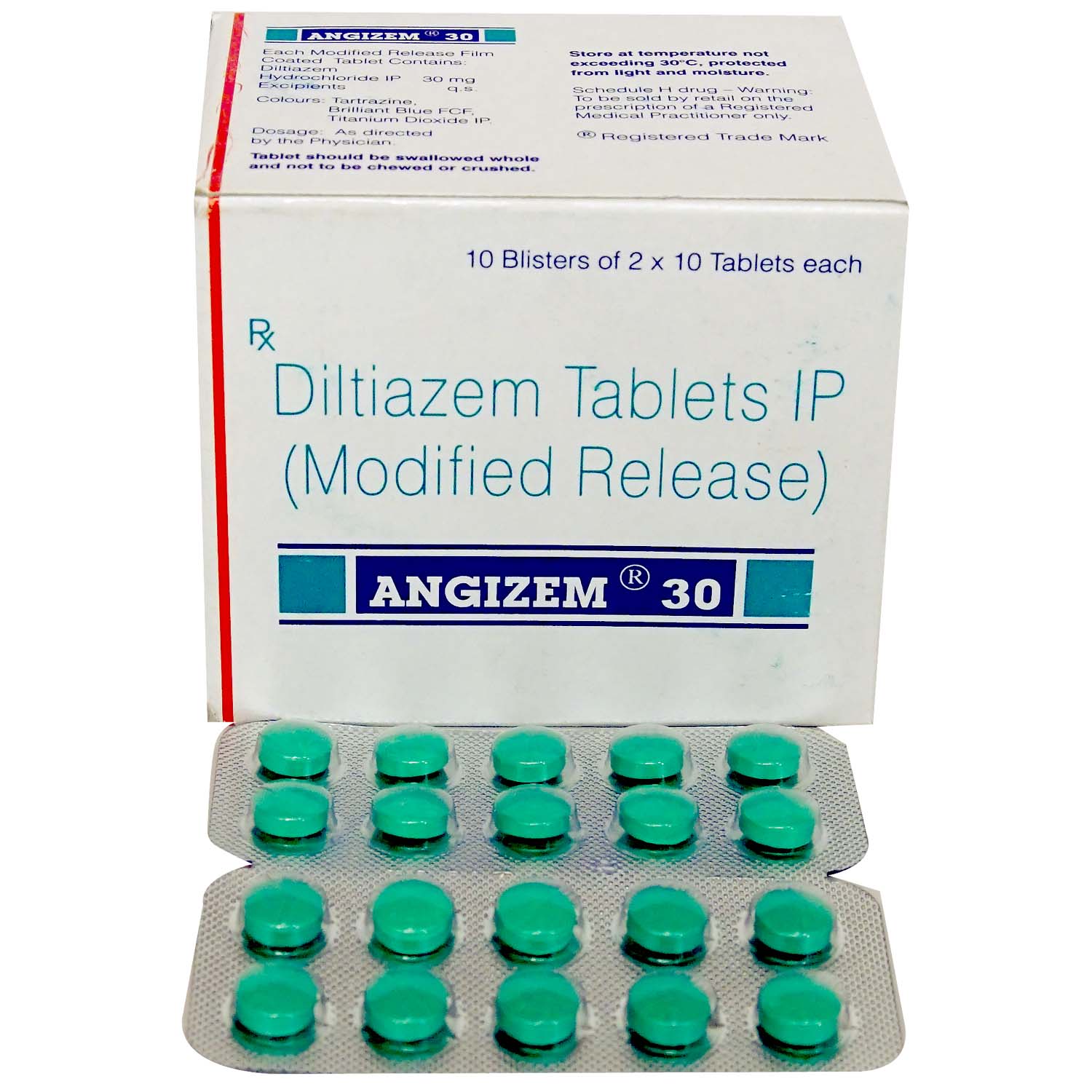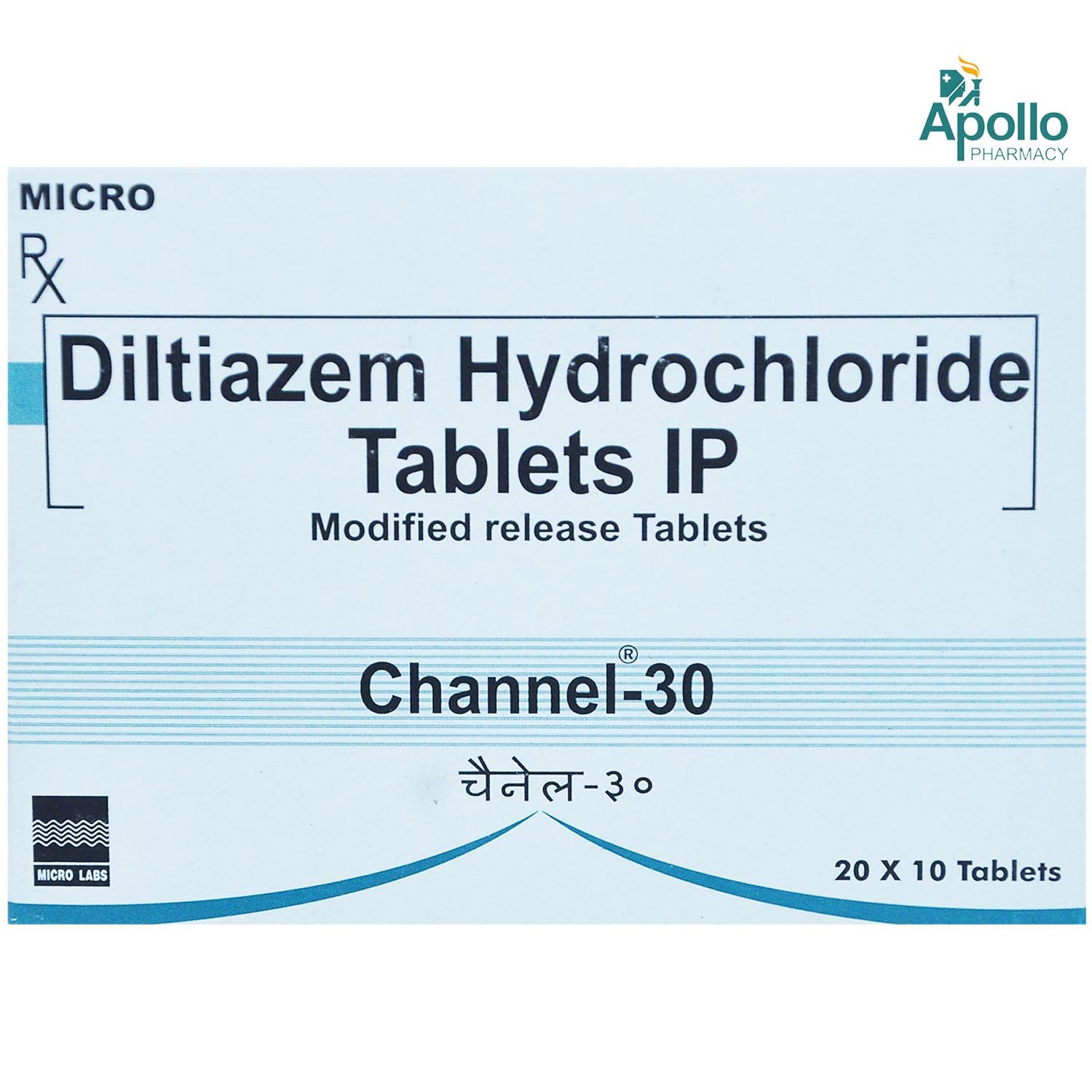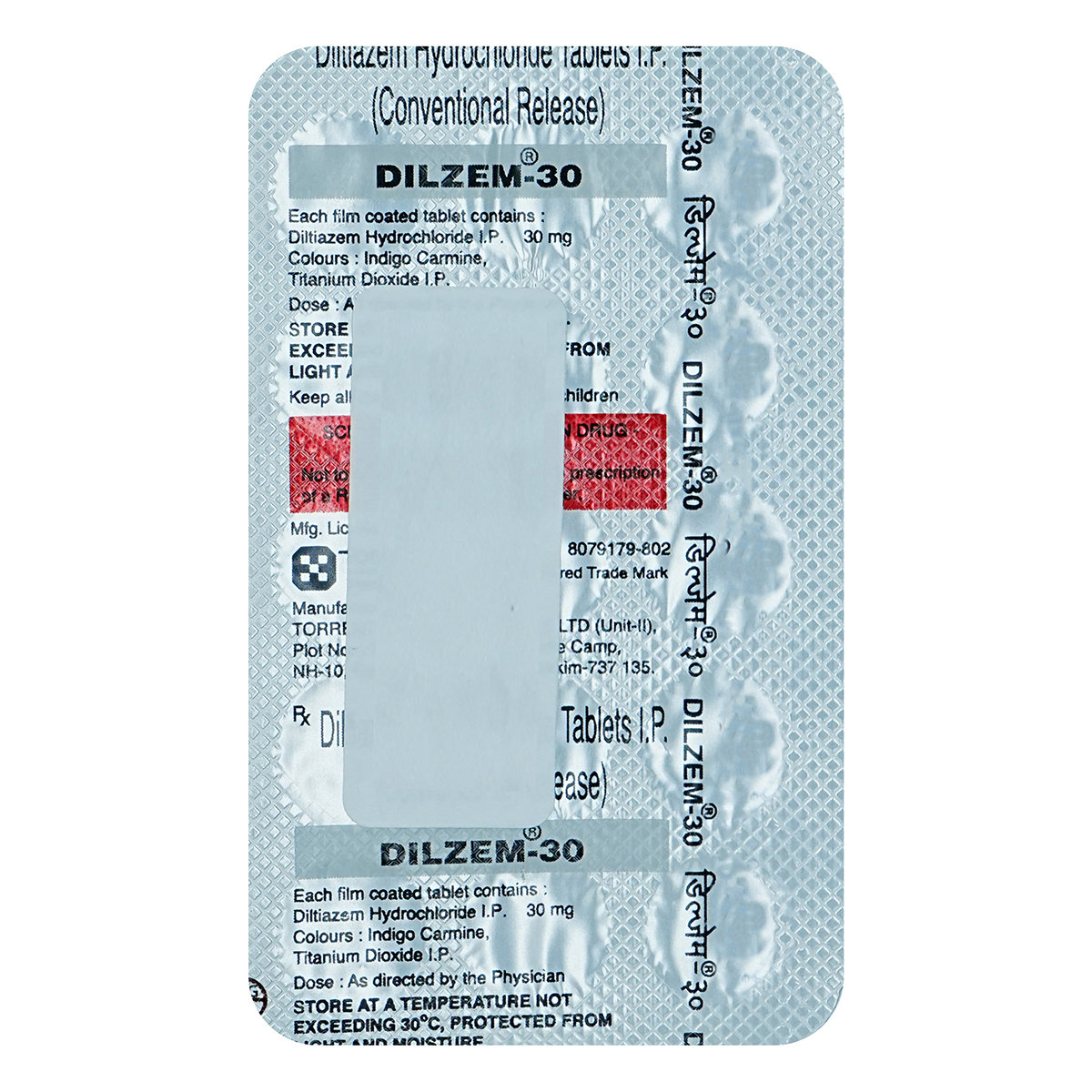Diltiaid 30 Tablet
MRP ₹26.5
(Inclusive of all Taxes)
₹4.0 Cashback (15%)
Provide Delivery Location
Online payment accepted
 Prescription drug
Prescription drugWhats That
About Diltiaid 30 Tablet
Diltiaid 30 Tablet belongs to the group of anti-hypertensive medicines called 'calcium channel blockers' used to treat mild to moderate hypertension (high blood pressure). It is also indicated in the management of chronic stable angina and angina due to coronary artery spasms. High blood pressure is a condition in which the blood exerts increased pressure on the walls of blood vessels leading to hypertension. Angina or chest pain occurs due to reduced blood flow to the heart, which is caused by narrowing or blockage of the heart's arteries (coronary artery).
Diltiaid 30 Tablet contains 'Diltiazem' which works by relaxing the blood vessels in the heart, thereby reducing the raised blood pressure. Diltiaid 30 Tablet eases anginal chest pain by preventing the narrowing of blood vessels and dilating the coronary arteries. As a result, Diltiaid 30 Tablet helps treat/prevent high blood pressure and angina.
Take Diltiaid 30 Tablet with or without food. You are advised to take Diltiaid 30 Tablet for as long as your doctor has prescribed it for you depending on your medical condition. In some cases, you may experience certain common side effects such as swelling in the hands, feet, and ankles, headache, dizziness, palpitations, constipation, and indigestion. Most of these side effects do not require medical attention and will resolve gradually over time. However, you are advised to talk to your doctor if you experience these side effects persistently.
Regular monitoring of blood pressure, electrolyte levels and kidney functioning is advised while taking Diltiaid 30 Tablet. Diltiaid 30 Tablet may cause dizziness, so drive only if you are alert. Avoid taking Diltiaid 30 Tablet if you are pregnant or breastfeeding; talk to your doctor, he/she may prescribe you an alternate medicine. Diltiaid 30 Tablet is not recommended for children as efficacy and safety have not been established. If you are due to undergo any surgery or dental procedure, inform the doctor that you are taking Diltiaid 30 Tablet. Keep your doctor informed about your medical history and medications to rule out any side effects/interactions.
Uses of Diltiaid 30 Tablet
Directions for Use
Key Benefits
Diltiaid 30 Tablet belongs to the group of anti-hypertensive medicines called calcium channel blockers used to treat mild to moderate hypertension (high blood pressure). It is also indicated in the management of chronic stable angina and angina due to coronary artery spasms. Diltiaid 30 Tablet works by inhibiting the movement of calcium ions across the heart muscle and smooth muscle linings of the blood vessels, thereby relaxing and widening the narrowed blood vessels making it easier for the blood and oxygen to reach the heart. This, in turn, helps in lowering the blood pressure and the risk of having a heart attack or stroke. Diltiaid 30 Tablet eases anginal chest pain by preventing the narrowing of blood vessels and dilating the coronary arteries.
Storage
- Wear compression garments like stockings, sleeves, or gloves to apply pressure and help stop fluid from building up, especially after the swelling goes down.
- Move around and do exercises to help the fluid circulate, especially in swollen limbs. Ask your doctor for specific exercises.
- Raise the swollen area above your heart level several times a day, even while sleeping, to help reduce swelling.
- Gently massage the swollen area with firm but not painful pressure.
- Keep the swollen area clean and moisturized to prevent injury and infection.
- Reduce salt intake to help prevent fluid from building up and worsening the swelling, as advised by a doctor.
- If the swelling does not get better after a few days of home treatment or worsens, consult your doctor right away.
- Exercise regularly and maintain a healthy weight.
- Manage cholesterol and blood pressure.
- Limit intake of caffeine and alcohol.
- Avoid vaping and tobacco smoke.
- Get enough sleep.
- Talk to your doctor about antiarrhythmic drugs or other medications to treat your condition.
- Rest well; get enough sleep.
- Eat a balanced diet and drink enough water.
- Manage stress with yoga and meditation.
- Limit alcohol and caffeine.
- Physical activities like walking or jogging might help boost energy and make you feel less tired.
- Eat smaller, more frequent meals.
- Eat slowly and chew your food thoroughly to help digestion.
- Eat fiber-rich foods such as fruits, whole grains, and vegetables to promote regular bowel movements.
- Avoid gas-producing foods like cabbage, beans, broccoli and carbonated drinks.
- Drink lots of water throughout the day to prevent dehydration and aid digestion.
- Do regular exercise to enhance digestion and reduce bloating.
- If you experience symptoms like coughing, wheezing, chest tightness, or difficulty breathing after taking medication, seek medical attention immediately.
- Your healthcare provider will work with you to stop the medication causing the reaction, start alternative treatments, and provide supportive therapy.
- To manage symptoms and prevent complications, follow your doctor's advice to use inhalers or nebulizers as prescribed, practice good hygiene, avoid irritants, stay hydrated, and get plenty of rest.
- Regularly track your symptoms and report any changes or concerns to your healthcare provider.
- Inform your doctor about dizziness symptoms. They may adjust your medication regimen or prescribe additional medications to manage symptoms.
- Follow your doctor's instructions for taking medication, and take it at the same time every day to minimize dizziness.
- When standing up, do so slowly and carefully to avoid sudden dizziness.
- Avoid making sudden movements, such as turning or bending quickly, which can exacerbate dizziness.
- Drink plenty of water throughout the day to stay hydrated and help alleviate dizziness symptoms.
- If you're feeling dizzy, sit or lie down and rest until the dizziness passes.
- Track when dizziness occurs and any factors that may trigger it, and share this information with your doctor to help manage symptoms.
- Report to Your Doctor: Inform your doctor about the muscle pain, as they may need to adjust your medication.
- Stretch Regularly: Gentle stretching can help relieve muscle pain and stiffness.
- Stay Hydrated: Adequate water intake supports muscle health by removing harmful substances and maintaining proper muscle function.
- Warm or Cold Compresses: Apply cold or warm compresses to the affected area to reduce pain and inflammation.
- Rest and Relaxation: Adequate rest helps alleviate muscle strain, while relaxation techniques like deep breathing and meditation can soothe muscle tightness, calm the mind, and promote relief from discomfort.
- Gentle Exercise: Participate in low-impact activities, such as yoga or short walks, to improve flexibility, reduce muscle tension, and alleviate discomfort.
- Consult a physician: If your symptoms don't improve or get worse, go to the doctor for help and guidance.
Drug Warnings
Do not take Diltiaid 30 Tablet if you are allergic to any of its contents, if you have/had low blood pressure, heart failure, low pulse rate, or if you are taking dantrolene (muscle relaxant), ivabradine (used to treat heart failure), or if you are currently in shock (reduced blood flow to organs). Inform your doctor if you have/had diabetes, liver or kidney problems, porphyria (a rare disease of the blood pigment), myasthenia gravis (muscle problems), heart problems, or constipation. Diltiaid 30 Tablet may cause mood changes and depression in some people. Consult your doctor immediately if you think you are affected. Diltiaid 30 Tablet is not recommended for use in pregnant women, breastfeeding mothers and children.
Drug-Drug Interactions
Drug-Drug Interactions
Login/Sign Up
When Lomitapide and Diltiaid 30 Tablet are taken together, the body's ability to process Lomitapide may be reduced.
How to manage the interaction:
Taking Diltiaid 30 Tablet with Lomitapide is not recommended, please consult your doctor before taking it.
When Flibanserin and Diltiaid 30 Tablet are taken together, the body's ability to break down Flibanserin may be reduced.
How to manage the interaction:
Taking Diltiaid 30 Tablet with Flibanserin is not recommended, please consult your doctor before taking it.
When Pimozide and Diltiaid 30 Tablet are taken together, the body's ability to break down Pimozide may be reduced.
How to manage the interaction:
Taking Diltiaid 30 Tablet with Pimozide is not recommended, please consult your doctor before taking it.
When Eliglustat and Diltiaid 30 Tablet are taken together, the body's ability to break down Eliglustat may be reduced.
How to manage the interaction:
Taking Diltiaid 30 Tablet with Eliglustat is not recommended, please consult your doctor before taking it.
Combining Tizanidine and Diltiaid 30 Tablet can lower your blood pressure.
How to manage the interaction:
Taking Tizanidine and Diltiaid 30 Tablet together can lead to an interaction, but it can be taken if your doctor advises. However, if you experience any headache, dizziness, lightheadedness, or irregular heart rate, contact your doctor immediately. Do not discontinue any medications without consulting your doctor.
When Diltiaid 30 Tablet is taken with Docetaxel, it can slow down the breakdown of Docetaxel in the body.
How to manage the interaction:
Taking Diltiaid 30 Tablet with Docetaxel together can possibly result in an interaction, but it can be taken if your doctor has advised it. If you're having any of these symptoms like feeling sick, throwing up, having diarrhea, mouth sores, swelling, nerve pain, or weakness, it's important to let your doctor know. They might have other options for you that won't cause these problems. Other symptoms like feeling tired, dizzy, or having trouble breathing, losing weight, or pain when you pee should also be reported to your doctor right away. Do not stop using any medications without first talking to your doctor.
Combining Diltiaid 30 Tablet with Pindolol can increase the risk of bradycardia.
How to manage the interaction:
Co-administration of Diltiaid 30 Tablet with Pindolol can result in an interaction, but it can be taken if your doctor has advised it. If you do experience any symptoms like feeling tired, having headaches, feeling dizzy or faint, gaining weight, having trouble breathing, feeling chest pain, or having an irregular heartbeat, it's important to let your doctor know right away." Do not discontinue any medications without first consulting your doctor.
Taking Nebivolol with Diltiaid 30 Tablet may increase the risk or severity of side effects.
How to manage the interaction:
Taking Nebivolol with Diltiaid 30 Tablet together can possibly result in an interaction, it can be taken if your doctor has advised it. However, if you experience fatigue, headache, fainting, weight gain, shortness of breath, chest pain, increased or decreased heartbeat, contact a doctor. Do not discontinue any medications without a doctor's advice.
Coadministration of fentanyl and Diltiaid 30 Tablet may significantly increase the blood levels and effects of fentanyl.
How to manage the interaction:
Although there is an interaction between Diltiaid 30 Tablet and fentanyl, they can be taken together if prescribed by your doctor. However, consult your doctor if you feel difficulty breathing or shortness of breath. Do not stop taking any medication without consulting your doctor.
Taking bosutinib with Diltiaid 30 Tablet can increase the blood levels of bosutinib. This can increase side effects such as nausea, vomiting, abdominal pain, and diarrhea.
How to manage the interaction:
Although there is an interaction between bosutinib and Diltiaid 30 Tablet, they can be taken together if prescribed by a doctor. However, consult a doctor if you experience fatigue, dizziness, fainting, unusual bruising or bleeding, fever, chills, diarrhea, sore throat, muscle aches, shortness of breath, blood in phlegm, weight loss, red or inflamed skin, body sores, and pain or burning during urination. Do not discontinue any medications without consulting a doctor.
Drug-Food Interactions
Drug-Food Interactions
Login/Sign Up
Diet & Lifestyle Advise
- You are advised to consume low salt and low-fat diet while taking Diltiaid 30 Tablet.
- Regular exercise is also recommended to complement treatment with Diltiaid 30 Tablet.
- Eat a diet rich in whole grains, vegetables, fruits.
- Avoid smoking and alcohol consumption.
- Maintain a healthy weight with proper diet and exercise.
- Managing stress with meditation, yoga, massage would also help in treating high blood pressure.
Side Effects of Diltiaid 30 Tablet
- Swelling in the hands, feet, and ankles
- Headache
- Dizziness
- Palpitations
- Constipation
- Indigestion
Habit Forming
Therapeutic Class
All Substitutes & Brand Comparisons
RX
Out of StockAltiazem 30mg Tablet
A. Menarini India Pvt Ltd
₹18.57
(₹1.67 per unit)
30% CHEAPERRX
Out of StockIsdil 30 mg Tablet 10's
East West Pharma India Pvt Ltd
₹20.4
(₹1.84 per unit)
23% CHEAPERRX
Out of StockEldizem-30Mg Tablet 10'S
Elder Pharmaceuticals Ltd
₹23.4
(₹2.11 per unit)
11% CHEAPER
Author Details
We provide you with authentic, trustworthy and relevant information
Drug-Diseases Interactions
Drug-Diseases Interactions
Login/Sign Up
FAQs
Drug-Drug Interactions Checker List
- DANTROLENE
- IVABRADINE
- SIMVASTATIN
- ATORVASTATIN
- LITHIUM
- WARFARIN
- ASPIRIN
- APIXABAN
- RIVAROXABAN
- THEOPHYLLINE
- METOPROLOL
- SALMETEROL+FLUTICASONE
- FORMOTEROL+BUDESONIDE
Special Advise
- Regularly monitor blood pressure levels to prevent hypotension (low blood pressure).
- Get up slowly while rising from a lying or sitting position as Diltiaid 30 Tablet may cause light-headedness.
- Women of child-bearing potential must use effective contraception while on treatment with Diltiaid 30 Tablet.
- To treat your condition effectually continue taking Diltiaid 30 Tablet for as long as your doctor has prescribed it. Try not to stop taking it on your own as it may cause a sudden increase the blood pressure, chest pain or heart attack.
- Your doctor may advise you to get regular tests while taking Diltiaid 30 Tablet if you have kidney and liver impairment.
Disease/Condition Glossary
High blood pressure (hypertension): It is a condition in which the blood exerts increased pressure on the walls of blood vessels leading to hypertension. This condition can lead to hardened arteries (blood vessels), decreasing the blood and oxygen flow to the heart. Raised blood pressure can cause chest pain (angina) and heart attack. Additionally, high blood pressure also causes brain damage (stroke) and kidney failure. Symptoms of high blood pressure include headache, dizziness, nose bleed, changes in vision, chest pain, weakness and dyspnoea (shortness of breath). However, most of the time, the signs and symptoms of hypertension are none.
Angina (chest pain): It occurs due to reduced blood flow to the heart, which is caused by narrowing or blockage of the heart's arteries (coronary artery). The blockade usually occurs due to the build-up of fat/cholesterol in the coronary artery. Symptoms include pain or tightness in the chest, neck, arms or back, weakness, lightheadedness, anxiety and abnormal heartbeat.

Have a query?
Alcohol
Safe if prescribed
You are recommended to avoid alcohol consumption while taking Diltiaid 30 Tablet to avoid unpleasant side-effects.
Pregnancy
Consult your doctor
Diltiaid 30 Tablet is pregnancy risk category C medicine, and its efficacy and safety have not been established. Hence, it is not recommended to take Diltiaid 30 Tablet while you are pregnant or planning for pregnancy. Please consult your doctor if you have any concerns regarding this.
Breast Feeding
Consult your doctor
It is not recommended to take Diltiaid 30 Tablet while you are breastfeeding as Diltiaid 30 Tablet may pass into breast milk. Please consult your doctor if you have any concerns regarding this.
Driving
Safe if prescribed
Diltiaid 30 Tablet may cause dizziness and tiredness, do not drive or operate heavy machinery if you experience these symptoms.
Liver
Consult your doctor
Dose adjustment may be needed. Diltiaid 30 Tablet should be used with caution in patients with liver disease. Please consult your doctor if you have any concerns regarding this.
Kidney
Consult your doctor
Dose adjustment may be needed. Diltiaid 30 Tablet should be used with caution in patients with kidney disease. Please consult your doctor if you have any concerns regarding this.
Children
Safe if prescribed
Diltiaid 30 Tablet is not recommended for children below 18 years of age, as the efficacy and safety have not been established.










_0.jpg?tr=q-85)

